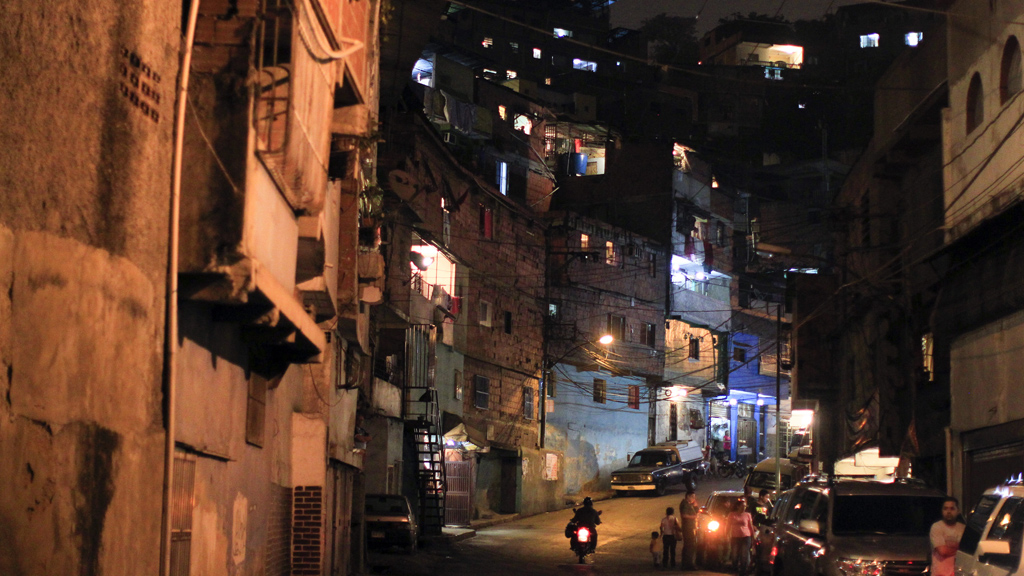Venezuela: the most dangerous place on earth?
With almost 28,000 murders in 2013, Venezuela is now considered one of the most dangerous countries in the world, despite government attempts to crack down on crime.

On Monday former Miss Venezuela Monica Spear, 29, and her ex-husband Thomas Henry Berry were gunned down in front of their five-year-old daughter in a roadside robbery in Venezuela. Ms Spear, who lived in Florida, was on holiday when the incident happened. Their five year old daughter was shot in the leg but survived.
The shooting was one of the latest high-profile incidents in a country where killings are common in armed robberies.
Enough of coming onto the street in fear for your life Mariangel Ruiz, Venezuelan actress
On Wednesday hundreds of Venezuelans gathered in the capital Caracas to protest against the wave of violence. Among them the actress Elba Escobar, who called on the government to act: “The power to solve this is with them. They have to do it. They have to do it now.”
Also protesting was actress Mariangel Ruiz, who said:
“Enough of coming onto the street in fear for your life, enough of knowing that our neighbour was killed, that our cousin was killed, that a friend who had not yet reached 30 and was just going about as a tourist with a five-year-old baby was killed and that her daughter was wounded on a highway.”
Violent crime soared during the 14-year rule of Hugo Chavez, who died of cancer in 2013.
Rising crime levels
In 2013, President Nicolas Maduro rolled out a security plan dubbed “Patria Segura,” which included mobilizing the military alongside the national police to fight crime.
Mr Maduro sent some 3,000 troops into the streets of the capital of Caracas to crack down on rampant crime that has made the OPEC nation one of the most dangerous in the world.
The plan was an effort to lower violent crime following close to 20 similar attempts during the 14-year rule of late socialist leader Chavez.
One prominent human rights group however criticized the plan on the grounds that the military is trained to fight wars and to control public order, not to prevent crime.
Official figures showed that more than 16,000 people were killed in Venezuela in 2012, an increase of 14 percent from the year before and a murder rate of 55.2 per 100,000 inhabitants, one of the highest in the world.
The country has one of the world’s highest murder rates — the United Nations has ranked it fifth globally – and violent crime is so rampant that Venezuelans tend to stay home after dark.
According to the non-profit Venezuelan Observatory of Violence (OVV), the oil-rich South American country’s murder rate was 79 per 100,000 inhabitants in 2013. The non-profit group said 95 percent of murders go unsolved.
However, international research group InSight Crime argued that OVV’s figures were “forecast based on past trends.”
InSight Crime said that the government claim of a reduced rate of 39 per 100,000 is confirmed by trends in death records at the Venezuelan Ministry of Health and drug crime statistics.
Cocaine problem
Venezuelans, despite being plagued by shortages of food and other goods, list crime as their most pressing worry.
According to the InSight Crime, the crime rate in Venezuela is even higher than Colombia, which is still in the midst of a civil conflict.
InSight Crime said that causes of gun crime include high levels of corruption, a lack of investment in the police force and weak gun control – all of which has led to a proliferation of arms and a lack of coherent security policy.
It also said that Venezuela has become a principal transit nation for Colombian cocaine.
The United Nations Office on Drugs and Crime said Venezuela does not produce sizeable quantities of cocaine, but it has become a transit country for cocaine from Colombia, Peru, and Bolivia, which is shipped to the United States and Europe.
Faltering economy
Inflation in Venezuela is also soaring, the currency is losing value on the black market, and foreign currency reserves are dwindling.
Even Venezuela’s once vaunted energy sector, crippled by lack of investment, is failing to generate enough revenue to subsidize domestic giveaways.
Economists say shortages of some consumer products in Venezuela stem from price controls that are meant to make basic goods available to the poorest, along with restrictions on foreign currency.
President Maduro claims anti-government forces, including the private sector, are causing the shortages to destabilise the country.